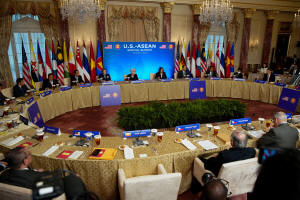U.S. hails 'new era' with ASEAN as summit commits to raise level of ties
 Send a link to a friend
Send a link to a friend
 [May 14, 2022] By
Jeff Mason, David Brunnstrom and Michael Martina [May 14, 2022] By
Jeff Mason, David Brunnstrom and Michael Martina
WASHINGTON (Reuters) -U.S. President Joe
Biden said on Friday a first summit in Washington with leaders from the
Association of Southeast Asian Nations (ASEAN) marked the launch of a
"new era" in the relationship between the United States and the
10-nation bloc.
In a joint 28-point "vision statement" after a two-day meeting, the two
sides took what analysts called a symbolic step of committing to raise
their relationship from a strategic partnership to a "comprehensive
strategic partnership" in November.
On Ukraine they reaffirmed "respect for sovereignty, political
independence, and territorial integrity," wording that a regional expert
said went further than past ASEAN statements. The statement did not
condemn Russia by name for its Feb. 24 invasion.
The summit marked the first time ASEAN leaders gathered as a group in
Washington and their first meeting hosted by a U.S. president since
2016.
Biden's administration hopes the effort will show that the United States
remains focused on the Indo-Pacific and the long-term challenge of
China, which it views as its main competitor, despite Russia's invasion
of Ukraine.

He was also hoping to persuade ASEAN countries to toughen their stance
on Russia's invasion of Ukraine.
Biden told the ASEAN leaders that "a great deal of history of our world
in the next 50 years is going to be written in the ASEAN countries, and
our relationship with you is the future, in the coming years and
decades."
Biden called the U.S.-ASEAN partnership "critical" and said: "We're
launching a new era - a new era - in U.S.-ASEAN relations."
Vice President Kamala Harris said the United States would remain in
Southeast Asia for "generations" and stressed the need to maintain
freedom of the seas, which the United States says is challenged by
China.
"The United States and ASEAN have shared a vision for this region, and
together we will guard against threats to international rules and
norms," Harris said.
Neither she nor Biden mentioned China by name. The United States has
accused China of using coercion against its neighbors.
Harris said Washington would continue to respond with ASEAN to the
threat of COVID-19, having already donated more than 115 million vaccine
doses to the region. She said both sides needed to show collective
ambition on climate change, accelerate the transition to clean energy,
and meet infrastructure needs sustainably.
ASEAN groups Brunei, Cambodia, Indonesia, Laos, Malaysia, Myanmar, the
Philippines, Singapore, Thailand and Vietnam. Myanmar's leader was
excluded from the summit over a coup last year. U.S. treaty ally the
Philippines, in transition after an election, was represented at the
meeting by its foreign minister.

Biden hosted a summit dinner at the White House on Thursday, and his
administration promised $150 million for areas including infrastructure,
security, pandemic preparedness and clean energy.
CHINA RIVALRY, SHARED CONCERNS
New U.S. commitments will include deployment of a Coast Guard vessel to
the region to help counter what the United States and regional countries
have described as China's illegal fishing.
[to top of second column]
|

U.S. Vice President Kamala Harris speaks during an event with
leaders of the Association of Southeast Asian Nations (ASEAN) as
part of the U.S.-ASEAN Special Summit, in Washington, U.S., May 13,
2022. REUTERS/Elizabeth Frantz

Still, U.S. spending pales in comparison to that of China, which in
November alone pledged $1.5 billion in development assistance for
ASEAN over three years to fight COVID and fuel economic recovery.
Biden on Friday announced the nomination of Yohannes Abraham, chief
of staff on his National Security Council, to be ambassador to
ASEAN, filling a post vacant since the start of Donald Trump's
administration in 2017. Biden is working on other initiatives,
including "Build Back Better World" infrastructure investment and an
Indo-Pacific Economic Framework (IPEF).
Gregory Poling, a Southeast Asia expert at Washington's Center for
Strategic and International Studies think tank, said the summit was
largely about symbolism with economics a missing component, as IPEF
is not expected to be launched until Biden visits Japan later in
May.
"Everyone seems happy and the diplomatic message of commitment is
landing. But ... a modest, to put it kindly, $150 million isn't
going to impress anyone," he said. "That leaves a lot riding on IPEF."
Raising the relationship to a comprehensive strategic partnership
matched similar moves by ASEAN with Australia and China last year.
"That's symbolically important, though it wouldn't change much in
concrete terms," Poling said.
He noted the statement on Ukraine did not condemn Russia by name,
but said "the call to respect Ukraine's sovereignty, political
independence and territorial integrity is an obvious criticism of
Russia and would seemingly commit all the ASEAN leaders to never
recognize any Russian annexation on Ukraine."
ASEAN countries share many U.S. concerns about China's
assertiveness, including its claim of sovereignty over vast swaths
of the South China Sea where several have rival claims.

However they remain cautious about siding more firmly with
Washington, given their predominant economic ties with China and
limited U.S. economic incentives. Some, like Vietnam, Laos and
Cambodia, have residual historical ties to Russia.
ASEAN states have been frustrated by a U.S. delay in detailing plans
for economic engagement since Trump quit a regional trade pact in
2017. Biden announced the intention to create IPEF at a virtual
summit with ASEAN leaders in October.
Analysts and diplomats have said only two ASEAN countries -
Singapore and the Philippines - are expected to be among the initial
group to sign up for negotiations under IPEF, which does not
currently offer the expanded market access Asian nations want given
Biden's concern for American jobs.
(Reporting by Jeff Mason, David Brunnstrom, Michael Martina, Steve
Holland, Trevor Hunnicutt, and Simon Lewis; Writing by David
Brunnstrom; Editing by Angus MacSwan, Nick Zieminski, Will Dunham,
Daniel Wallis and William Mallard)
[© 2022 Thomson Reuters. All rights
reserved.]
This material may not be published,
broadcast, rewritten or redistributed.
Thompson Reuters is solely responsible for this content.
 |